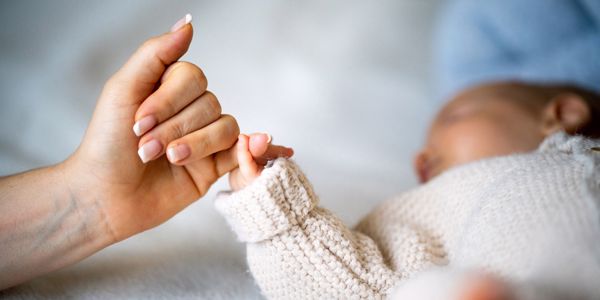Postpartum psychosis is a rare but serious mental health condition that can occur after childbirth, affecting around 1 to 2 women per 1,000 births. Unlike postpartum depression, which is more common and may develop gradually over the weeks and months following birth, postpartum psychosis tends to onset quickly—often within the first few days or weeks after birth.
The exact cause of postpartum psychosis isn't fully understood, but it is believed to be linked to the dramatic hormonal changes that occur after childbirth, as well as genetic factors, personal or family history of mental health disorders, and certain environmental stressors.
Mums with a history of bipolar disorder or schizophrenia are particularly at risk, although postpartum psychosis can occur in women with no previous mental health issues.
Recognising the Signs and Symptoms
Postpartum psychosis typically presents with a range of symptoms that can change rapidly. These symptoms are often severe, and in many cases, women experiencing postpartum psychosis may not realise that something is wrong while they are suffering. This makes it crucial for loved ones and healthcare providers to be vigilant when it comes to spotting postpartum psychosis.
Some of the key signs and symptoms include:
Delusions
These are false beliefs that don't align with reality. A mum experiencing postpartum psychosis might believe that her baby is in danger, that her baby isn't her own, or that external forces are controlling her actions or thoughts.
Hallucinations
Hallucinations involve seeing, hearing, or feeling things that aren't there. For example, a mum might hear voices telling her to harm herself or her baby, or she may see or feel things that aren’t real.
Extreme Mood Swings
Women with postpartum psychosis can experience extreme highs (mania) or lows (depression). These mood changes can be more severe than typical postpartum emotional fluctuations and may come on suddenly. Mania might present as increased energy, hyperactivity, and an inability to sleep, while depressive episodes could involve feelings of despair, guilt, or worthlessness.
Confusion and Disorientation
Postpartum psychosis can often cause a mum to feel confused and disoriented. She may struggle to focus, follow conversations, or understand what is happening around her, in a way that doesn’t seem to be in line with how she normally acts.
Paranoia
Mums experiencing postpartum psychosis may also become paranoid about the people and things around them, believing that others are plotting against them or that their baby is in danger from someone. This can lead to mistrust of even close family members or healthcare professionals. This concern can also be around common objects or things around the home posing a risk to the baby.
Behavioural Changes
Drastic changes in behaviour are common with postpartum psychosis. This could mean acting in ways that are completely out of character—speaking incoherently, becoming unusually agitated, or displaying obsessive behaviours. In some cases, a mum might express a desire to harm herself or her baby, which is a medical emergency requiring immediate intervention. Call 999 if you or one of your loved ones has thoughts about causing harm in any way.
Insomnia
Inability to sleep, even when physically exhausted, is another sign of postpartum psychosis. Mums might claim to not be tired, or appear overly energised, even when running off little or no sleep. Lack of sleep may exacerbate other symptoms such as confusion, hallucinations, and mood swings.
When to Seek Help for Postpartum Psychosis
Postpartum psychosis is a medical emergency. If you or someone you know is showing signs of postpartum psychosis, it’s crucial to seek immediate medical attention. Early intervention can significantly improve the outcome and ensure the safety of both mum and baby.
Call 999 or go to A&E if:
- There are thoughts of harming the baby or oneself.
- There are signs of hallucinations or delusions.
- There is behaviour that is completely out of character or showing extreme confusion.
Even if the symptoms don’t seem an immediate risk, contact your GP, midwife, or mental health services immediately. Prompt diagnosis and treatment are essential for the proper management of postpartum psychosis.
Treatment Options for Postpartum Psychosis
Postpartum psychosis is treatable, but it often requires hospitalisation to ensure the safety of both the mum and baby. Treatment often involves a combination of:
Medication
Psychological Support
Electroconvulsive Therapy (ECT)
Supporting a Loved One Through Postpartum Psychosis
Caring for someone with postpartum psychosis can be a difficult and overwhelming experience. Here are some ways to support them:
- Encourage Professional Help: Gently but firmly encourage the mum to seek help from a healthcare professional. It’s important to recognise that she may not be aware of the severity of her condition or in denial about suffering at all.
- Offer Practical Support: After initial treatment, help with daily tasks such as cooking, cleaning, and looking after the baby, allowing the mother to focus on her recovery.
- Be Patient: Recovery from postpartum psychosis can take time. It’s important to offer emotional support and understand that progress may be slow.
- Ensure Safety: If the mum expresses thoughts of harming herself or her baby, ensure that she is not left alone and seek emergency medical help.
While it can be scary, with the necessary treatment, most people make a full recovery from postpartum psychosis. However, it’s important to note that recovery can take several months, and some may experience ongoing mental health challenges, such as postpartum depression or anxiety.
Early detection and intervention are key when it comes to postpartum psychosis. By being informed about the signs and symptoms, families and healthcare providers can ensure that new mums receive the care and support they need to recover fully and enjoy their time with their new baby.
If you or someone you know is experiencing symptoms of postpartum psychosis, don’t wait—reach out for help immediately. The right support can make all the difference in ensuring a safe and healthy recovery.






